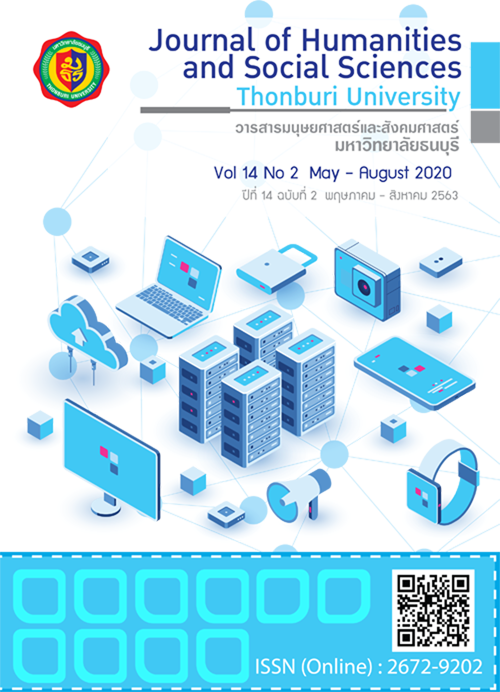Community Based Tourism Management by Tourist Destination Development Process
Keywords:
People participate, The management of tourist destination, Thailand tourism standardAbstract
This research is a study of tourism development process. By using the elements of factors that lead to the success of the management of 7 elements, 1. Planning of responsible tourism sites 2. Tourism area management
3. Management of access to tourist attractions 4. Facilities management 5. Management of quality providing services in tourist attractions 6. Management of tourism activities and 7. Management of environmental and natural conservation. Perform component analysis (Factor Analysis), which is a statistical technique to group or include variables that are related in the same group from the analysis, it can be divided into 9 elements. Therefore, in order to obtain guidelines for developing tourist sites. The researcher therefore used the elements from the analysis of 9 to form a tourism development process by integrating with community participation in tourism management. After that, check the data triangulation, including representatives from the Department of Tourism. Representatives from the Tourism Authority of Thailand and representatives from Designated Areas for Sustainable Tourism Administration. The researcher gave the name to this process that AEI3 tourist attraction development process (the development of tourist attraction is AIE to the 3rd power)
References
กรมการท่องเที่ยว. (2557). มาตรฐานการบริหารจัดการแหล่งท่องเที่ยวของไทย. กรุงเทพฯ: กระทรวงการท่องเที่ยวและกีฬา.
กระทรวงการท่องเที่ยวและกีฬา. (2562). วารสารกระทรวงการท่องเที่ยว. กรุงเทพฯ: กระทรวงการท่องเที่ยวและกีฬา
กัลยา วานิชย์บัญชา. (2549). สถิติสำหรับงานวิจัย. พิมพ์ครั้งที่ 2. กรุงเทพฯ: โรงพิมพ์จุฬาลงกรณ์มหาวิทยาลัย.
จิราภรณ์ แก้วมณี. (2557). การจัดการการท่องเที่ยวโดยชุมชนตามปรัชญาของเศรษฐกิจพอเพียง ชุมชนบ้านหัวเขาจีน อําเภอปากท่อ จังหวัดราชบุรี. วิทยานิพนธ์ ศศ.ม., มหาวิทยาลัยศิลปากร 2557.
พิมพ์ลภัส พงศกรรังศิลป. (2557). การจัดการการท่องเที่ยวชุมชนอย่างยั่งยืน: กรณีศึกษา บ้านโคกไคร จังหวัดพังงา. วารสารวิชาการ Veridian E-Journal. 7(3).
วรรณวิมล ภู่นาค. (2557). ศักยภาพชุมชนในการจัดการท่องเที่ยวโดยชุมชน: กรณีศึกษาตลาดนํ้าอัมพวา. วารสารวิทยบริการ มหาวิทยาลัยสงขลานครินทร์. 26(1).
Haywood, Farmer, J. (1988). A Conceptual Model of Service Quality. International Journal of Operations & Production Management. 8(6): 19-29.
Liu, J.C., Sheldon, P.J. and Var, T. (1987). Resident perception of the environmental impacts of tourism. Annals of Tourism Research. 14(1): 17–37.
Moore, T. G. (1994). Core-Periphery Models, Regional Planning Theory and Appalachian Development. The Professional Geographer. 46(3): 316-331.
Murphy, P.E. (1985). Tourism: A community approach. New York, NY: Methuen.
Phunak, v. (2015). The Potentials of Amphawa Community in Managing Community-Based Tourism of the Amphawa Floating Market. Academic Services Journal Prince of Songkla University. 26(1). (in Thai)
Swarbrooke, J. (1999). Sustainable tourism management. Oxon, UK: CABI.
T. Jamal and Getz, D., (1995). The Environment-Community Symbiosis: A Case for Collaborative Tourism Planning. Journal of Sustainable Tourism.
Williams, A.M. and G. Shaw. (1988). Tourism: Candyfloss Industry or Job Generator?. Town Planning Review. 59(1): 81-103.
Translated Thai References
Department of Tourism Ministry of Tourism and Sports. (2015) Thailand Tourism Standard Tourism Management. Bangkok: Ministry of Tourism and Sports. (in Thai)
Kaewmanee, J. (2014). Community-based tourism management in accordance with the philosophy of sufficiency economy of Baan Hua Khao Jean community, phaktor district, Ratchaburi province. Master of Education Program. Silpakorn University. (in Thai)
Ministry of Tourism and Sports. (2011). Ministry of Tourism and Sports Journal. Bangkok: Ministry of Tourism and Sports. (in Thai)
Pongsakornrangsilp, P. (2013). The Management of Sustainable Community Based Tourism: The Case of Ban Kokekrai, Phang Nga Province. Veridian E-Journal. 7(3). (in Thai)
Vanichbuncha, K.(2006) Statistical Analysis for Research. 2th ed. Bangkok: Chulalongkorn University Printing House, 2006. (in Thai)







